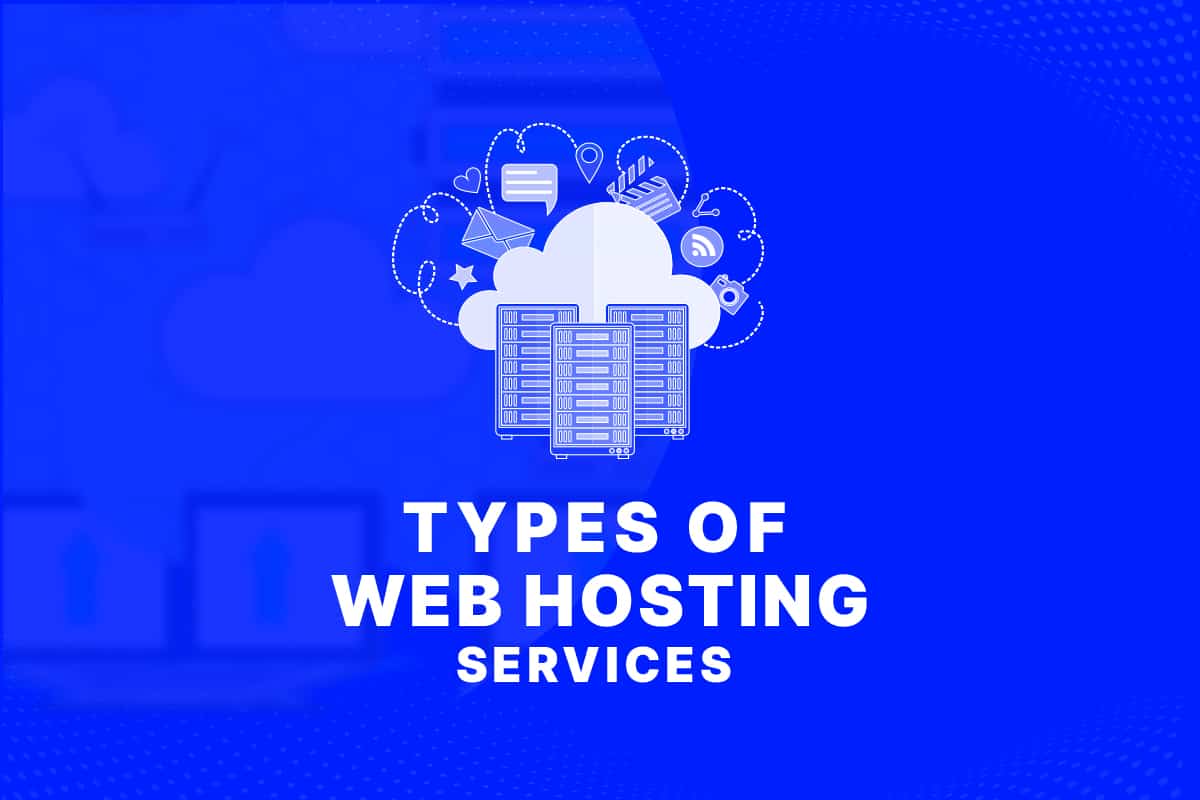When setting up a website, one of the first things you need to do is choose a web host. But what is web hosting service, and what should you look for when choosing a web host?
Web hosting is simply the process of storing your website files on a server. When someone visits your website, they can access these files and view your website.
There are many types of web hosting, but the most common is shared hosting. This is where your website’s files are stored on the same server as other websites. The main advantage of shared hosting is that it is very affordable.
However, there are also some disadvantages to shared hosting.
One of the most significant disadvantages is that your website may be slower to load if there are a lot of other websites on the same server. Additionally, if one of the other websites on the server gets a lot of traffic, it can affect the performance of your website.
The main thing is that you have to check everything the pros and cons before choosing the right web hosting service provider.
Your web hosting company should be responsive and easy to connectable.
I will discuss this in detail in this post too.
What is web hosting, and how does it work?
Web hosting is a service that allows individuals or organizations to store their websites on a server that anyone with an internet connection can access. This allows businesses and individuals to make their websites accessible without investing in their infrastructure.
When you purchase a web hosting service, you are essentially renting space on a server that will host your website. The web hosting service provider will give you a certain amount of space, bandwidth, and resources that you can use to store your website and make it accessible to visitors.
To understand how web hosting works, it is essential first to understand the basics of how the internet works. The internet is a network of computers connected. When you visit a website, your computer sends a request to the hosting server. The server then responds by sending the requested information back to your computer.
The time it takes for the server to respond to your request depends on several factors, including the website’s size, the number of visitors, and the distance between your computer and the server. If the website is large or receives a lot of traffic, it may take longer for the server to respond.
What is a web server?
A web server is a computer system that processes requests via HTTP, the basic network protocol that distributes information on the World Wide Web. A web server can be a program running on a single computer or a networked service with multiple computers handling requests.
When a user enters a URL into their web browser, they request a web server. The server then fetches the requested resource and returns it to the user’s browser. Web servers are essential to the World Wide Web, handling billions of requests daily.
Many web servers are designed to handle different workloads and provide other performance levels. Some standard web server software includes Apache, Nginx, Microsoft IIS, and Lighttpd.
Types of web hosting services
There are four primary types of web hosting services: shared, virtual private server (VPS), dedicated, and cloud. Each type has its features and benefits that businesses can take advantage of. According to your budget and service you want to also also poke you to choose the best web hosting for your personal websites or business websites.
Shared Web Hosting:
Shared web hosting is the most popular and affordable type of web hosting. This service will host your website on the same server as other websites. The main benefit of shared web hosting is that it is very affordable. However, the downside is that your website may be affected by the activities of other websites on the same server.
VPS Web Hosting:
Virtual private server (VPS) web hosting offers more resources and privacy than shared web hosting but at a higher price. With VPS hosting, your website will be hosted on a server that is partitioned from other websites. This gives you more control over your server resources and ensures that your website will not be affected by the activities of other websites.
Dedicated Web Hosting:
Dedicated web hosting is the most expensive type but offers the most resources and privacy. With dedicated hosting, your website will be hosted on its server. This means that you will have complete control over your server resources, and your website will not be affected by the activities of other websites.
Cloud Hosting:
Cloud hosting is a newer type of web hosting that has become very popular in recent years. With cloud hosting, your website will be hosted on a network of servers. This provides you with more flexibility and scalability than other types of web hosting, but it can also be more expensive. But best cloud hosting service also give your site a boost and helps to get better visibility in search ranking.
So, which type of hosting is best for SEO?
And how to choose the best hosting for SEO is another question you should consider before selecting the right hosting plan.
It depends on your needs. Shared hosting may be a good option if you’re on a budget.
If you need more control over your environment, VPS hosting may be a better choice. And if you need the most flexibility, cloud hosting may be the best option.
WordPress web hosting
WordPress web hosting is a type of web hosting that is designed explicitly for WordPress websites. WordPress is a content management system (CMS) widely used by millions of websites worldwide.
WordPress websites usually require more resources and unique configurations than other types of websites, so WordPress web hosting plans typically offer more features and are pricier than regular web hosting plans.
Some WordPress web hosting providers even offer managed WordPress hosting, a more expensive and comprehensive type of hosting that includes special WordPress-specific features and services.
So, you must be aware of choosing the best WordPress web hosting when you choose WordPress as your content management system.
Reseller hosting
Reseller hosting is a type of web hosting in which the account owner can resell hosting services to other customers. The account owner typically purchases a block of disk space and bandwidth from a larger hosting company and then resells those resources to their customers. Reseller hosting is often used by web design and development companies who need to offer their clients a complete web hosting solution but don’t want the hassle of managing their servers. Reseller hosting can also be a good option for individuals who wish to start their own web hosting business.
Choosing the correct type of web hosting for your business depends on your needs and budget.
If you are starting, shared web hosting may be your best and cheapest option. If you have a larger budget and need more resources, VPS or dedicated hosting may be a little costlier than shared hosting plans. Many web hosting service providers offers free trian plans on web hosting and some web hosting service providers allows you pay as you go option as well.
And if you need the most flexibility and scalability, cloud hosting may be your best option. Ensure it meets your business needs for whichever type of web hosting you choose.
How to choose the right web hosting for your business?
There are a few things you should take into account when choosing a web hosting provider for your business. First, you need to determine what type of hosting services you need.
Do you need shared, dedicated, or virtual private server (VPS) hosting?
Shared hosting is the most economical option, but it doesn’t offer the same level of resources and security as dedicated or VPS hosting.
Dedicated hosting provides you with your server, giving you more control over the environment and making it more secure. However, it is more expensive than shared hosting.
VPS hosting lies somewhere between shared and dedicated hosting in terms of price and resources.
You should also consider the operating system (OS) that you need.
Do you want to use Linux or Windows?
Linux is typically more affordable and offers a variety of open-source applications, while Windows is more expensive but provides a wide range of proprietary software.
Finally, choose a web hosting provider that offers excellent customer support if you have any problems.
This is important because you don’t want your website to go down and lose customers due to a technical issue.
A good web hosting provider can help you troubleshoot problems and get your website back up and running quickly.
Do some research and choose a web hosting provider that’s right for your business. It’s essential to ensure you select a reputable provider that offers the features and resources you need at a price you can afford.
Things you should check before signing up with a web hosting provider:
Here are some factors to consider:
- 1. Bandwidth and disk space limitations
- 2. Pricing
- 3. Features and add-ons
- 4. Customer support
- 5. Security
- 6. Reputation
When looking for a web hosting platform for your business, you must consider a few key factors before deciding. Here are six things to keep in mind:
1. Bandwidth and disk space limitations: Make sure you know how much bandwidth and disk space your website will need. Some web hosts have low limits that could cause your site to crash if you get too much traffic.
2. Pricing: Compare prices between different web hosts. Some web hosting platforms are more expensive than others, but you may be able to find a good deal if you’re willing to shop around.
3. Features and add-ons: Make sure the web host you choose offers the features and add-ons you need for your website. Some hosts offer basic plans that don’t include certain features, so you’ll need to upgrade if you want them.
4. Customer support: Find out what customer support the web host offers. Some hosts have better customer support than others, so it’s essential to choose one that will be able to help you if you run into any problems.
5. Security: Make sure the web host you choose offers secure hosting. This is especially important if you plan to sell products or services on your website.
6. Reputation: Choose a web host that has a good reputation. You can check online reviews to see what other people say about the different web hosts you’re considering.
Benefits of using a professional web hosting service
A professional web hosting service can provide your website with the stability, reliability, and performance it needs to succeed. Here are some of the benefits of using a professional web hosting service:
1. Increased uptime: When you use a professional web hosting service, your website will be up and running more often. This is because professional web hosting services have the resources and infrastructure necessary to keep your website up and running 24/7.
2. Improved performance: Professional web hosting services use high-performance servers specifically designed for hosting websites. Your website will load faster and be more responsive than if hosted on a shared server.
3. Enhanced security: Professional web hosting services provide your website with enhanced security features, such as firewalls and malware protection. This can help to protect your website from hacking attempts and other online threats.
4. Scalability: Professional web hosting services offer scalable plans that allow you to easily upgrade your website’s hosting package as your needs change. This means you can start with a basic hosting package and upgrade to a more comprehensive package as your website grows.
5. Support: When you use a professional web hosting service, you’ll have access to 24/7 customer support. If you have any problems with your website, someone will be available to help you resolve them quickly.
6. Expert Service Providers: Professional web hosting providers are experts in their field. They can offer you advice on optimizing your website for better performance and help you troubleshoot any problems you may have.
7. Money Back Guarantee: Many professional web hosting services offer a money-back guarantee so that you can try their service without risk. This allows you to test the features and benefits of a professional web hosting service before committing to a long-term contract.
8. Free Migration Services: Some professional web hosting providers offer free migration services. This means that if you’re currently using another hosting web service, they can help you move your website to their platform with minimal downtime.
9. Flexible Plans: Professional web hosting providers offer a variety of plans that allow you to choose the features and benefits that best meet your needs. You can choose an essential strategy for a small website or a more comprehensive plan for a more extensive website.
10. Discounts: Many professional web hosting providers offer discounts to new customers. This can help you save money on your first year of service.
When you use a professional web hosting service, you’ll enjoy increased uptime, improved performance, enhanced security, scalability, support, and expert service providers. You may also be eligible for discounts and free migration services. With so many benefits, it’s easy to see why a professional web hosting service is the best choice for your website.
Difference between web hosting and domain names
When setting up a website, one of the first things you need to do is choose a web host and register a domain name. But what’s the difference between these two services?
A web host is a company that provides space on a server for your website so that it can be accessed by people online. A domain name is your website’s address on the internet. It’s what people will type into their browsers to find your site.
You can think of web hosting as the plot of land your house sits on and your domain name as the address of your home. Just like you need a piece of land to build a house on, you need web hosting to build a website. And just like you need an address to tell people where your home is, you need a domain name to tell people where your website is.
To create a website, you’ll need to get web hosting and a domain name. In many cases, you can buy both services from the same company. But sometimes, you may want to register your domain name with one company and host your website with another.
Now that you know the difference between web hosting and domain names, you can start planning your website!
Domain Name Checker
Instantly check domain availability. If the domain name isn’t registered, you can use a domain registrar for registering your domain. It’ll take time to choose a hosting company and point the domain to another hosting company to get the same. Alternatively, purchasing hosting that offers free domain registration will be an easier and cheaper solution. If you’re unhappy with our services, you can move the website to another server. Make sure your web hosting provider supports your site structure.
What is web hosting : FAQs
Let me take a look at several common questions you may ask when it comes to web hosting.





